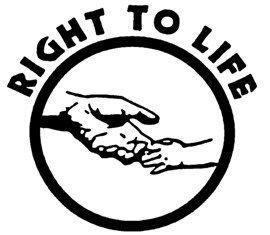The Will To Die- Euthanasia.
May 01, 2019 • 197 views
The most courageous act is still to think for yourself. Aloud.
To live or to die, but surely to decide.

THE WORD- EUTHANASIA.
The word euthanasia, originated in Greece means a ‘good death’. It encompasses various dimensions, from active like inducing something to cause death to passive like withholding treatment or supporting measures. Euthanasia is voluntary, where consent is taken and involuntary where consent from the guardians are taken. Request for premature ending of life has its own debate sprouting really strong arguments from sides, one supporting and the other being against. The debate cuts across complex and dynamic aspects like it being legal, ethical, rightful, heath wise, religiously believing, spiritual, social and cultural aspects of a highly civillised society.
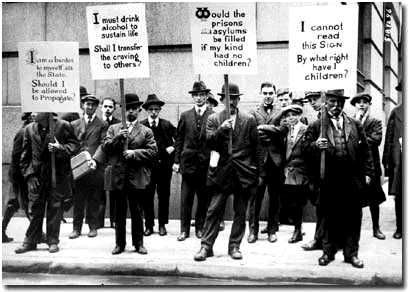
ESA 1938
Euthanasia Society of America (ESA) was founded in New York to gain social and legal acceptance for the “right” to kill vulnerable human beings
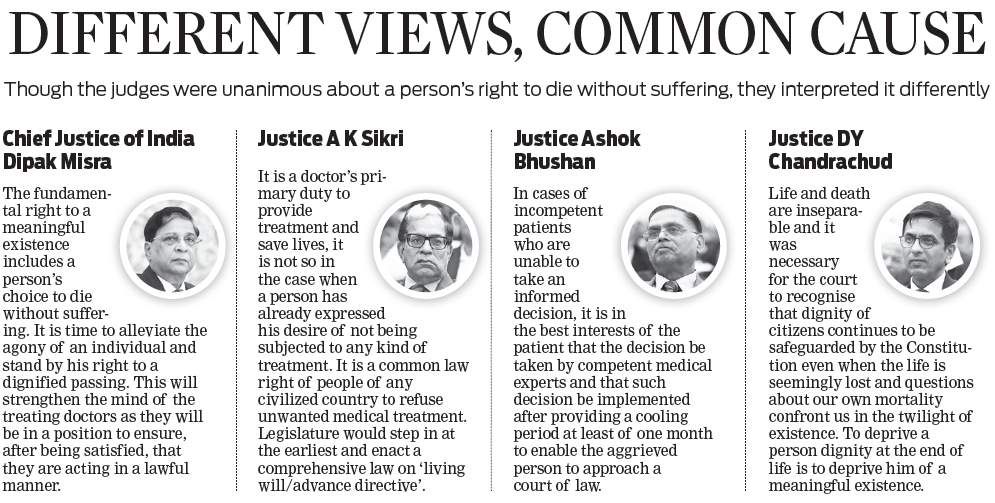
According to Article 21 says, “No person shall be deprived of his life or personal liberty except according to procedure established by law”. Right to life under Article 21 does not include Right to die. But recently, the Supreme Court has given legal sanction to passive euthanasia in a landmark verdict, permitting 'living will' by patients on withdrawing medical support if they slip into irreversible coma. The ruling came after a petition was filed by an NGO named 'Common Cause', who had approached the court seeking a direction for recognition of 'living will'. Passive euthanasia is withdrawal of medical treatment with the deliberate intention to hasten the death of a terminally-ill patient.
Euthanasia is allowed in some countries of the European Union — Luxembourg, the Netherlands, and Belgium. In Belgium, euthanasia is allowed in the case of terminally ill children. In Switzerland, it is allowed only in the case of advanced malignancy or in the case of intractable pain and suffering.
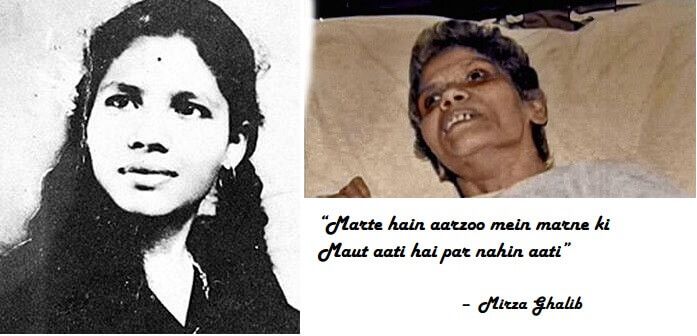
Aruna Shanbaugwas left with severe brain damage and paralysed after the 1973 attack by a ward attendant in the Mumbai hospital where she worked. She was fed through the nose to keep her alive but developed pneumonia. Her case sparked a debate about India's euthanasia laws.
........................................................................................................................................................................
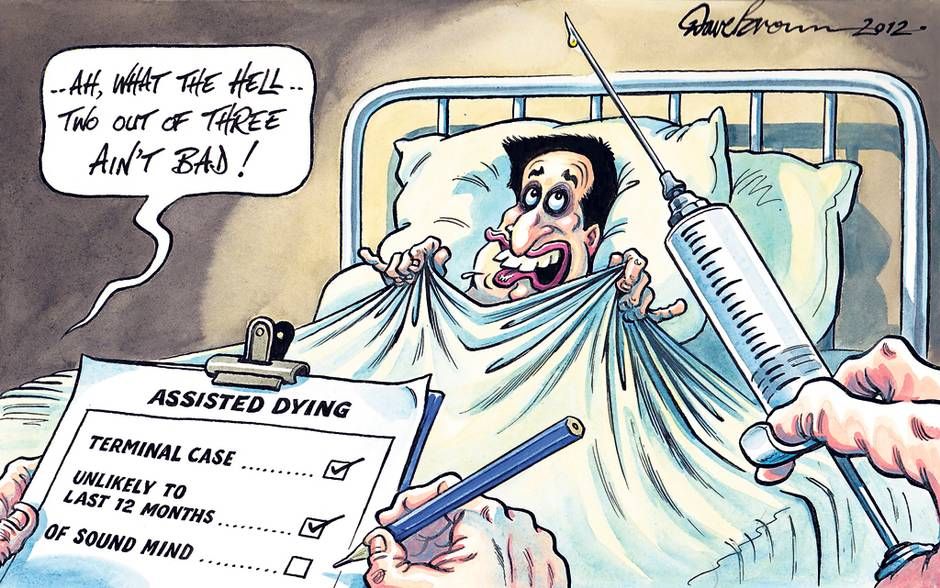
Arguments against the legalizing of euthanasia.
The ethics of euthanasia asks some really compelling questions like is right to end the life of a terminally ill patient who is undergoing severe pain and suffering be justified? Or under what circumstances can euthanasia be justifiable, if at all? Is there a moral difference between killing someone and letting them die?
At the heart of these arguments, people question the very morals and value of human existence. Should human really have the right to decide on life or death?
The practical arguments portray how this shouldn’t be allowed as the exploitation of the codes of euthanasia could easily be practised in a land like ours.
In the Aruna Shanbaug case that forced debates, we also must know how Shanbaug was in position to decide for herself. In cases like this where the patient is in no position to undertake a stand self, where families know that the high dose medicines aren’t helping the patient to return to normalcy, in cases like these, euthanasia could be considered for once. But for mentally alert but physically disabled, it should be a big no.
The persistent fear of probability of it being misused is high. Usually such killings can also be classified as homicide. In a straight argument against it getting legalized, people say India is still not prepared to welcome this move.
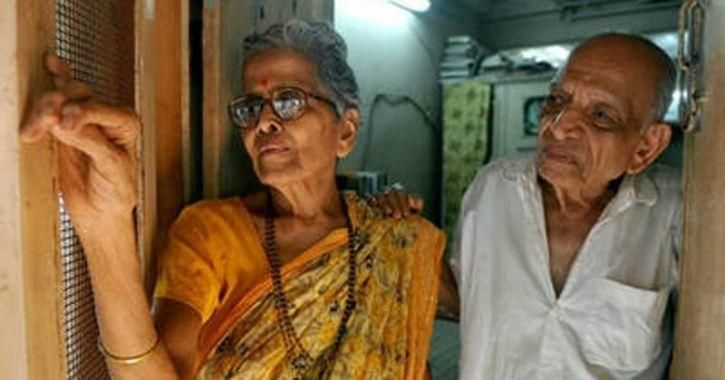
"I am angry because i am noy dying", says Narayan Lavate.
Arguments in favour of legalizing of euthanasia.
Giving a real example, Narayan Lavate (88) and Iravati Lavate (78) from Maharashtra say that they do not wish to be a burden on society in their old age. They don’t have children and their siblings are no more alive. They argue that spending the country’s scarce resources on keeping them alive, the old and ailing alive, is a criminal waste. This is simple logic. They also ask: What is the point in wasting money in treating old-age ailments when one has to eventually die? According to Iravati, their desire to die is driven by logic, not spirituality.
Arguments here are if Article 21 gives one right to live, it also should loudly give right to take away life too. The right to live includes right to live with absolute dignity which gets lost when one is forced to rely on medicines or kin for support. Those in favour of euthanasia think that there is no reason why euthanasia can't be controlled by proper regulation, but they side by side they acknowledge that some problems will remain. It will be difficult to deal with people who want to implement euthanasia for selfish reasons thus regulation is what they demand
Another entrancing fact related to euthanasia questions that if a person can no longer live with dignity, has he/she got the right to choice. Extending it further to ponder that weather the right to life include right to choice. If yes, then this very argument of not allowing euthanasia turns void (on the grounds of fundamental rights). The more abstract jurisprudence content that arises is whether there is a right to choose at all, and if there is, will it govern the right to life or be subservient to it.
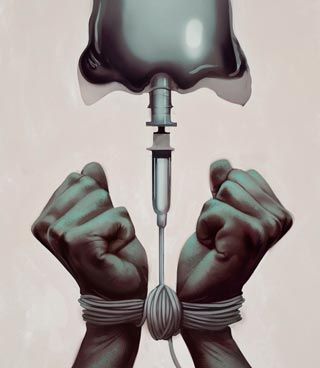
All in all it must be considered very wisely of how and on what grounds euthanasia be granted. The norms defining it will have to take constructive points of euthanasia battling with the negative points. Its the approaching winds of change that demand to rise and have strong decison on this very issue. The contardiction of denying right to die in a nation that stands on the pillar of right to live needs to be subtly tackled by the arguments that go aginst euthanasia being legallized.
